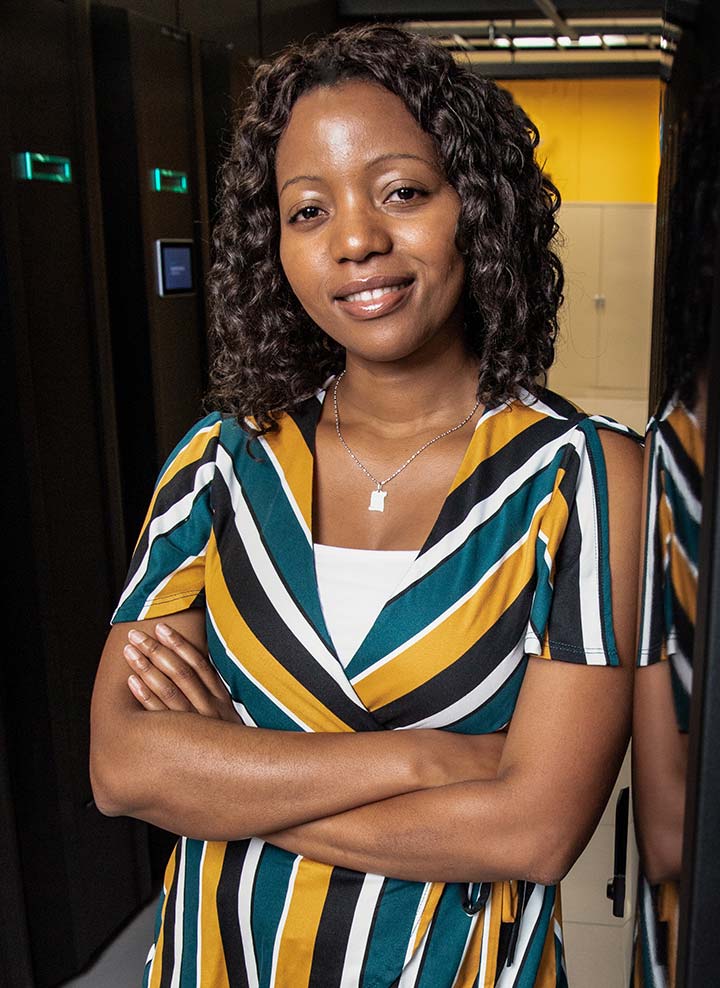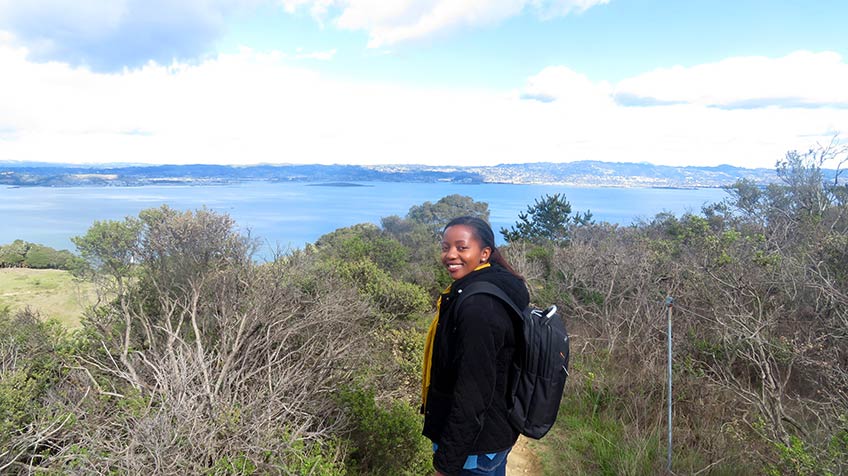Juliette Ugirumurera: Solving Real-World Computational Problems Between Two Worlds
Rwandan native NREL computational scientist leads key transportation simulations while inspiring women in STEM across the globe

At NREL, Ugirumurera leads simulation efforts for several transportation projects, including Athena, a U.S. Department of Energy (DOE)-funded, national lab-led multiyear project aimed at improving the efficiency of transportation hubs through advanced high-performance computing. She is exploring traffic at the curbside—how cars leave the airport and come to the airport—as well as looking at how emerging technologies like autonomous vehicles could impact future operations. She's also leading the simulation work on another mobility project focused on Chattanooga, Tennessee, looking at ways NREL can use traffic control to reduce congestion and energy use.
"Whatever project I'm working on should have an impact on a real person in their day-to-day lives," she said.
Ugirumurera enjoys her work and likens it to solving puzzles, always searching for creative solutions.
"They're tougher, harder puzzles," she said of her projects, "but it is the same process. I have this goal I am trying to reach. This is the input I have—how can I reach this goal? It's the same kind of problem-solving aspect."
As far back as primary school in Rwanda, Ugirumurera said she remembers math as one of her favorite subjects—one in which she always excelled. This was the beginning of her love for problem-solving—a passion that, later in life, would help bring her across the world to NREL.
Rwandans take two national exams in their academic careers: one after sixth grade and one after completing high school. These align with a declared focus of study; Ugirumurera selected math and physics as hers. The top 1% of students are offered scholarships through a collaboration between the Rwandan government and U.S. schools. In her graduating year, Ugirumurera was one of 60 students who received scholarships and one of 10 who went to Oklahoma Christian University.
STEM from the Start
Ugirumurera set herself up for success in a STEM career from an early age. She said if asked, she would tell young girls considering careers in STEM fields to look at computer science and engineering as future paths.
"There is a way to apply all that math and physics that you love," she said. "I know for me, it's really important to solve real-world problems. I would tell them that math and physics can address real-world problems."
In her day-to-day work, Ugirumurera said sometimes she'll be the only woman in a full day of meetings, and it might take more energy to speak up because when she does, she sounds different than the others in the room—but she doesn't see this as a limitation.
"There is a sense of knowing I can do this," she said. "It doesn't matter your gender; it's what your brain can do."

A Clash of Cultures
Ugirumurera spent a few years in the United States before landing at NREL in 2018. She worked as a postdoctoral fellow for a little over a year and a half at Lawrence Berkeley National Laboratory applying high-performance computing to transportation problems, and she completed her Ph.D. in computer science at the University of Texas at Dallas in 2016.
Adjusting to a new country and a new culture wasn't seamless for Ugirumurera.
"It was challenging," she said. "I did experience culture shock. The first thing is just being in a new environment where you have to speak English 24/7 when you used to just speak it in class. The culture is different. The expectations are different."
In Rwanda, she explained, meeting someone for the first time is very different, and few details are exchanged.
"You might know someone for months without knowing their name," she said. "Here, it was surprising to meet someone and know their name and how many kids they have. In my culture, they'll welcome you, but it takes a while to go into details and somebody's private life."

Back Home
When Ugirumurera returns to visit Rwanda—and she tries to every two years—people are curious about her work abroad. Most recently, she returned in March and gave a presentation about her research at Carnegie Mellon University Africa. She said many people expressed interest in the work she was doing, noting transportation as a key issue all over the world—but people also wanted to know what life is like in the United States.
She said she's often asked if America is how it's portrayed in the movies, and she tells them it's close, but the movies are skewed.
"You only see New York and California, the big cities," she said. "You don't see the day-to-day life of an American. You think if you come over, it's going to be like New York, but that is not the case!"
When it comes to the success she's found in her career, Ugirumurera credits the communities in which she grew up—both at home in Rwanda and here in the States.
"My family was very supportive during my Ph.D., and so were all the mentors I've encountered throughout this journey," she said. "I've met a lot of good American friends and families who were just always there. Community is a big part of my career success."
Learn more about NREL's computational science research and transportation research.
Last Updated May 28, 2025
